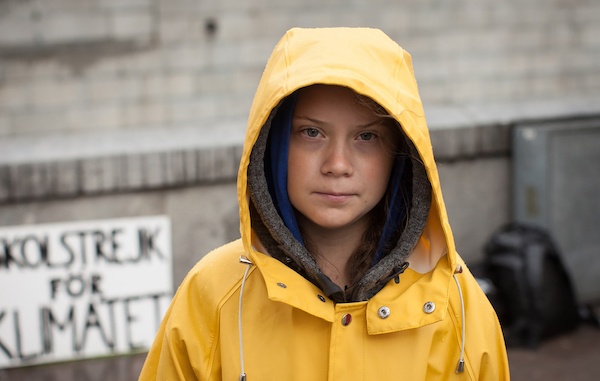Film Review: “I Am Greta” — A Superb Love Song to a Teenager Fighting to Save the Planet
By Gerald Peary
As Greta Thunberg travels the world, invited to speak to government bodies everywhere, she doesn’t ever mince her words or try to build bridges. “You have messed up the environment!” is her shrill, righteous message.
I Am Greta, directed by Nathan Grossman. At the Kendall Square Cinema.

Director Nathan Grossman made the wise decision to stay close on Greta Thunberg’s face for most of the film. Photo: Image Net.
The insidious deeds of the far-right stretch into every corner, and here’s today’s example: the excellent documentary, I Am Greta, which champions Greta Thunberg, teenage climate activist, has a terrible “42% liked this movie” among Google users. It has an even more miserable 3.2 rating out of a possible 10 from 1,905 IMDb voters. There seems only one explanation for these rotten “amateur” reviews: an organized sabotaging of the votes by climate change deniers to take this movie down. Make no mistake: Thunberg, who has had serious death threats, has enemies everywhere, among the lowest of people, and even in the highest nativist places. Vladimir Putin has publicly questioned her scientific conclusions, Brazil’s president Bolsonaro has labeled Thunberg a “brat” for her railing against his kamikaze policies in the Amazon rain forests. Does anyone remember one Donald Trump? At one of his rallies, he shouted out her name, “Greta!” in the most disdainful, disrespectful way, and his yahoo storm troopers, of course, booed her on cue.
With adversaries like these, what’s not to embrace about Greta Thunberg, 15 (now 17)-year-old Swedish schoolgirl with a serious mission to save our planet? Director Nathan Grossman’s film is a love song to his protagonist, and that’s OK with me. She deserves every accolade. Greta’s great. More than great. As she travels the world being invited to speak to government bodies everywhere, she doesn’t ever mince her words or try to build bridges. “You have messed up the environment!” is her shrill, righteous message. “You have stolen my dreams with your empty words. How dare you! You have failed us! Young people see your betrayals.” Thunberg has no illusions about the effect of her rhetoric. She realizes that even those in power who thank her for her activism are doing nothing substantive to improve the environment. The Paris Climate Accord, for one, is a charade. Still, she won’t give up marching or her militancy, her always speaking up. She says, “We have to say the same thing over and again until people get it.”
So who is this little hellfire? In real life, Thunberg is a painfully shy and vulnerable teenager, who, if the world wasn’t being destroyed, would prefer being absorbed in her schoolwork, hanging out with her family, playing with her beloved dogs. Or spending the day horseback riding, after first hugging tightly her favorite equine in his stable. She was a hurt, unpopular child, and stayed home from school for a year suffering from depression. She has Asperger’s disorder, which is perhaps a reason she can so obsess about climate change, and knows every fact about environmental issues, far more, she realizes, than politicians and journalists. But please don’t call Greta a hero or a role model, or gush, “You’re the girl who started it all.” She winces and gasps every time she is so complimented. The authentic Greta is, away from the microphone and bullhorn, the tiny person sitting across a conference dining room table from another girl but saying nothing, scared to make eye contact. “I hate small talk,” she confesses. Or, as she confides to France’s President Macron, “I’m a nerd.”
Filmmaker Grossman is his own cameraman, and his wise decision is to stay close on Greta’s face for most of the film. This intimacy is a present to the viewer, to see the lovely, tender ways Greta thinks and reacts. It’s a blessing every time a quiet smile breaks through on her hyper-serious, pained visage. There are even a couple of moments when Greta giggles with happiness: seeing her dogs on her cell phone at the end of a hard day of muckraking; her adolescent amusement at her dad’s weird expression in a selfie when the two of them posed with Pope Francis, and declaring, “I feel like peeing my pants!”
Gerald Peary is a Professor Emeritus at Suffolk University, Boston, curator of the Boston University Cinematheque, and the general editor of the “Conversations with Filmmakers” series from the University Press of Mississippi. A critic for the late Boston Phoenix, he is the author of nine books on cinema, writer-director of the documentaries For the Love of Movies: the Story of American Film Criticism and Archie’s Betty, and a featured actor in the 2013 independent narrative Computer Chess. His new feature documentary, The Rabbi Goes West, co-directed by Amy Geller, is playing at film festivals around the world.

